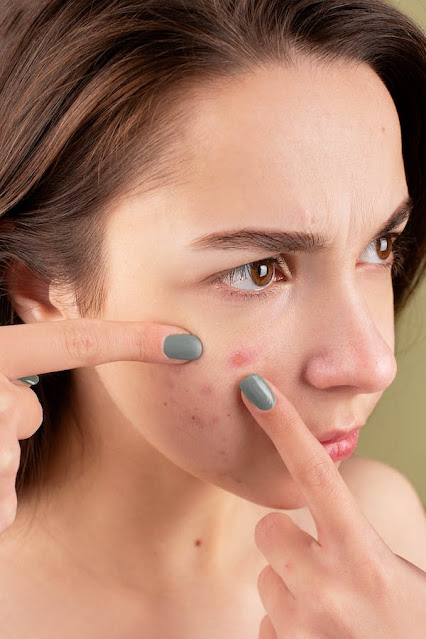Which over the-counter acne treatments are most effective?
Description:
Absolutely, choosing the right acne medication can be overwhelming. To find the best products for your skin, consider your skin type, the severity of your acne, and any specific concerns you might have. It's a good idea to consult with a dermatologist for personalized advice.
Understanding how different ingredients work and tailoring your skincare routine accordingly can greatly help in managing and preventing acne effectively.
It's important to be cautious when using nonprescription acne products. If you experience severe reactions or persistent irritation, discontinuing use and seeking medical advice is recommended.
Ingredients in acne treatments that are active:
Certainly, there are several active ingredients commonly found in acne products. Benzoyl peroxide, for instance, works by killing acne-causing bacteria and also helps to unclog pores. Salicylic acid aids in removing dead skin cells and unclogging pores as well. Retinoids like tretinoin encourage the growth of new skin cells while preventing clogs. It's important to choose products with ingredients that suit your specific skin type and concerns.
Peroxide of benzoyle:
This chemical helps to eliminate excess oil from the skin, kills acne-causing bacteria, and removes dead skin cells that can block pores. Products containing benzoyl peroxide are sold over the counter in strengths ranging from 2.5% to 10%. According to studies, preparations with lower strengths are just as effective as those with higher strengths. To reduce the risk of adverse effects, start with a water-based product that is 2.5 percent stronger.
Dry skin, scaling, inflammation, burning, and stinging are all potential side effects, particularly if you have sensitive skin. Applying benzoyl peroxide requires caution because it might bleach clothing and hair. Postinflammatory hyperpigmentation, which might persist after acne has cleared up, is not bleached by it.
Adapalene:
This component, a retinoid, aids in clearing clogged pores and preventing fresh breakouts. Adapalene gel (Differin) is offered over-the-counter at a 0.1% concentration. Applying this product to skin with a cut, sunburn, or eczema outbreak is not advised. When the gel is applied, you can experience a minor stinging, but it soon goes away. Dry skin, scaling, and irritated skin are further potential adverse effects. To alleviate these symptoms, use a moisturiser that is noncomedogenic.
Acid salicylate:
This component might aid in clearing clogged pores and avoiding fresh outbreaks.
solutions containing salicylic acid are available over-the-counter in concentrations ranging from 0.5% to 2% as both leave-on and wash-off solutions. Mild stinging, skin discolouration, and moderate skin irritation are potential adverse effects.
An azelaic acid:
This moderately antimicrobial component aids in preventing clogged pores. 10% strength azelaic acid products are over-the-counter. Additionally, postinflammatory hyperpigmentation, which can persist after acne has cleared up, can be treated with azelaic acid.
The alpha hydroxy acids:
The acids found in milk, sugar cane, and fruits that contain sugar are called alpha hydroxy acids. Glycolic acid and lactic acid are two forms of alpha hydroxy acids that are utilised in over-the-counter acne treatments. By eliminating dead skin cells and relaxing irritated skin, they treat acne. A new layer of smoother skin might grow as a result of alpha hydroxy acids. This enhances the appearance of pores and acne scars.
Choosing an acne treatment:
Your skin type, acne kind, and skin care preferences will determine which acne products are ideal for you. Here are some general recommendations for picking and applying over-the-counter topical acne medications:
Adapalene and benzoyl peroxide should be used first:
Start with an acne treatment that contains benzoyl peroxide, adapalene, or both if you're unsure which to purchase. Both are efficient and typically accepted. According to certain studies, they work best when together. Before expecting to see effects, give it a few days.
Start with acne treatments of lower strength:
This can lessen other issues, such as dry, itchy skin, and inflammation. If necessary, gradually increase the product's potency and frequency of usage. Spread out this across a few weeks. This aids in your skin's treatment acclimation.
Utilise many products:
Use multiple products, each containing a different active ingredient or combination of active substances, to treat obstinate acne. To help prevent skin irritation, you can use one product in the morning and a different one at night.
Select the form that is most useful to you:
There may be different formulations of the substance you need, such as a soap, cream, gel, or ointment. Creams typically cause less irritability than gels or ointments. However, ointments and gels better penetrate the skin. Gels may make your.
skin feel dry and stinging. You could find ointments to be overly oily. Before you find a product that works for you, you might need to test a few others.
Keep calm:
It takes effort and perseverance to effectively treat acne with over-the-counter topical medications. Before you start seeing effects, it can take 2 to 3 months of everyday use. And before it gets better, acne can grow worse.
Tips for skin care when using acne medications:
• A single step in your skin care routine is using acne products. Using acne treatment products.
• Wash skin that is prone to acne twice daily.
• Use your hands to wash your face twice a day with warm water and a mild cleanser Cetaphil, Vanicream, etc.). Be kind. Acne might get worse if you scrub and cleanse it too much. Avoid using masks, astringents, and face scrubs. They frequently cause skin irritation, which can exacerbate acne and the negative consequences of your medicated acne treatment.
• Try using towelettes or cleaning cloths. These are mild substitutes for cleaners and washings. For dry, delicate skin, open weave fabrics are best. Dead skin cells can be more effectively removed by using tighter-woven fabrics. Remove your makeup at the end of the day if you wear it.
• Use the ideal quantity. Just enough product should be used to cover the face in a thin layer. Apply it immediately following skin cleaning. You don't need to use additional products containing these active components after cleansing because some cloths and towelettes already contain benzoyl peroxide and other active chemicals.
• Use water based face products sparingly. For your facial moisturisers, acne concealers, and cosmetics, choose noncomedogenic products. They facilitate avoiding blocked pores and.
• You're absolutely right! Choosing water-based or noncomedogenic products can help prevent acne by reducing the likelihood of clogged pores. Opting for silicone- or glycerin-based hair products can also be a good alternative to heavy oil-based ones, and applying hair oil away from your forehead and temples can help prevent breakouts in those areas.
• You've provided some great tips for maintaining healthy skin and preventing acne. It's important to avoid picking or squeezing blemishes to prevent infection and scarring. Keeping your hair off your face, protecting your skin from things that transfer sweat or oil, using sunscreen, and showering after strenuous activities can all contribute to clearer skin.
Absolutely, seeking professional advice from a healthcare provider or dermatologist is a good step if your acne doesn't improve after a few months of using over-the-counter products. They can provide personalized recommendations and prescribe stronger treatments if necessary.







